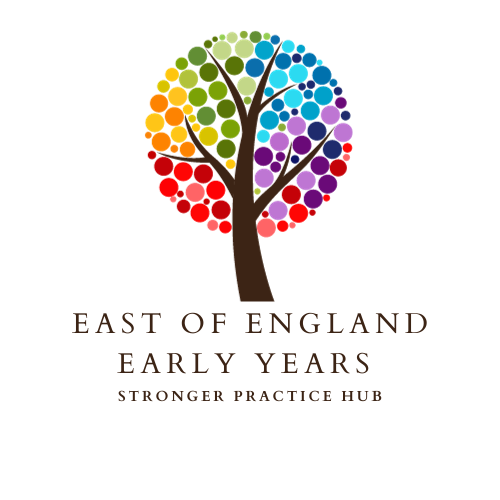By Ruth Coleman and Eileen Allpress
Ruth is Headteacher of Highfield Nursery School and leads the East of England Stronger Practice Hub and Eileen is the Research Lead for the hub.
Foundations for the Future: Nurturing Self-Regulation and Executive Function in the Early Years
The EEF have recently launched their latest strand on the Evidence Store, called Self-Regulation and Executive Function. The Evidence Store shares approaches and practices to support self-regulation and executive function in the Early Years. It is accessible and easy to read, and is fast becoming the ‘go-to resource’ for those working in the early years.
Self-regulation and executive function are often misunderstood and practitioners find difficult to define. The EEF suggest they are closely interrelated and rely on each other:
‘Self-regulatory skills can be defined as the ability of children to manage their own behaviour and aspects of their learning. In the early years, efforts to develop self-regulation often seek to improve levels of self-control and reduce impulsivity. These skills are also sometimes described as executive function capability.’
EEF Early Years Toolkit Self-regulation strategies | EEF (educationendowmentfoundation.org.uk)
Executive Function: Mental processes that can help children resist their impulses and control how they direct their attention.
EEF: EY Evidence Store EEF| Self-Regulation and Executive Function (educationendowmentfoundation.org.uk)
Self-regulation enables children to monitor their emotions and thoughts and choose how to adapt their behaviour. Executive function refers to a set of skills that are often used together.
Executive function can help children resist their impulses and control how they direct their attention. It also helps children to hold information in mind. Self-regulation and executive function are often applied together to help children gain greater control over their thoughts, actions and emotional responses.
When children are in an emotionally safe environment, with consistent and predictable routines, they are more able to demonstrate regulated behaviour.
However, Self-regulation is NOT to be confused with: self-control, compliance or sitting nicely on the carpet and listening to the practitioner/teacher
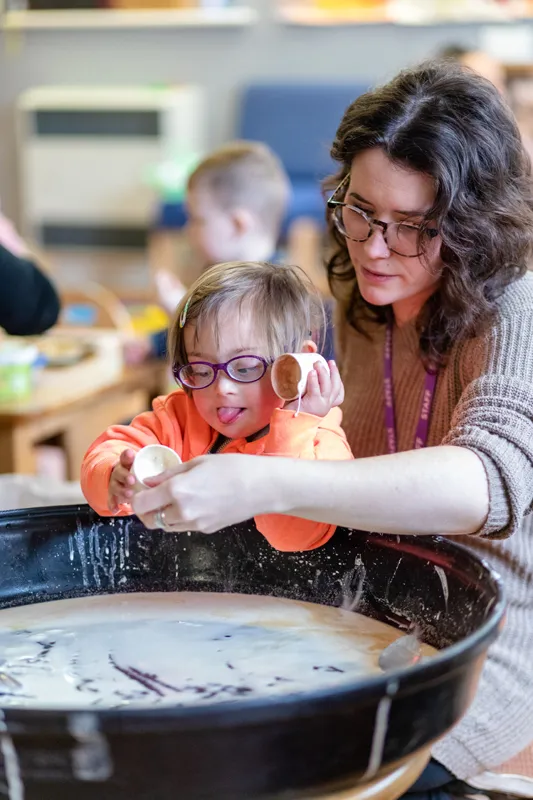
Co-regulation: Children who are dysregulated, can be impulsive and lack self-awareness. They are often unpredictable and hyper-vigilant, meaning they can react explosively to seemingly minor interactions and experiences. For examples, a child who has yet to develop self-regulatory strategies will see another child on the trike and pull them off to have a go. This is where we, as early years practitioners can support the development of self-regulation in the moment. Offering co-regulation to the child, by providing the words the child needs, e.g. “Shall we ask Flo if you can have a go on the trike when she has finished? Flo, would you let Finlay know when you have finished with the trike?”
Co-Regulation: When an adult provides responsive support to bridge the gap between the child’s current and their potential capacity to regulate in a particular situation (Evidence Store)
In this instance, the practitioner has responded to the situation and expanded the interaction to model a strategy to support the child’s further interactions with their peers. When this strategy is repeated, over time the child will internalise and develop a toolbox of strategies and thus build their capability to self-regulate.
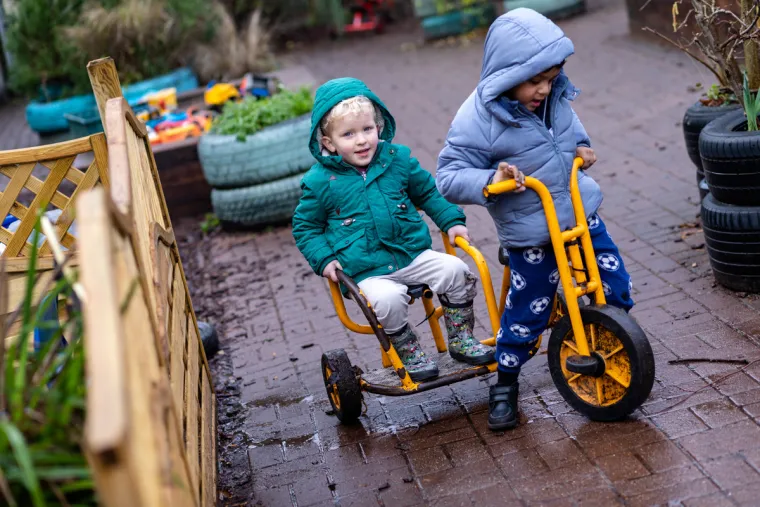
Other strategies may include offering a sand timer or showing other play resources available in the garden, whilst they wait for the trike.
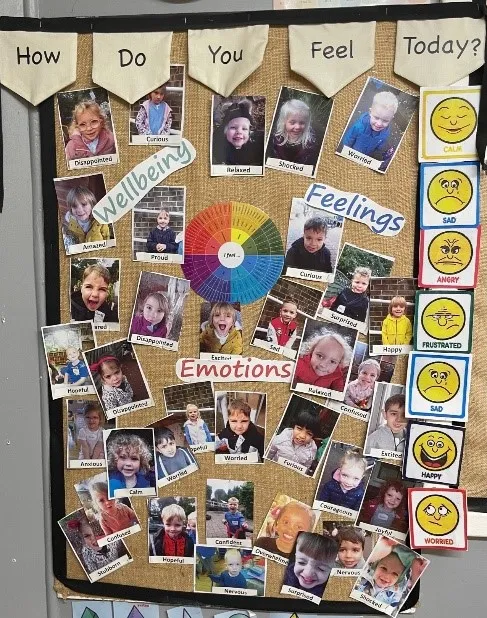
Display showing the children in nursery showing a range of emotions. This display is repeated in the nursery garden.
When interested practitioners engage children in playful experiences, sharing back and forth conversation, children can benefit from co-regulation, a stepping stone on the way to self-regulation. This should be seen as a vital part of the key person role.
Role of the key person
It is an EYFS statutory requirement that each child is assigned a key person.
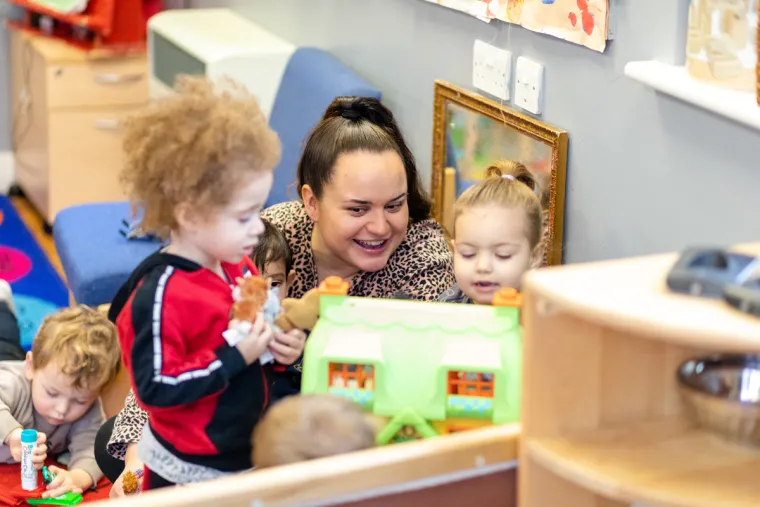
‘Their role is to help ensure that every child’s care is tailored to meet their individual needs, to help the child become familiar with the setting, offer a settled relationship for the child and build a relationship with their parents and/or carers. They should also help families engage with more specialist support if appropriate’ (DfE, 2024).
The key person is also ideally placed to share co-regulation strategies with parents and carers and to help children with the big, often overwhelming emotions they can experience in early childhood.
So, what can we do to support the development of self-regulation?
- The keyperson provides emotional security, particularly at the most stressful times, such as transitions
- We provide children with the time and opportunity to express their emotions in a safe and nurturing way, helping build skills in self-regulation over time
- Time and opportunity to access sensory play – ensuring we offer a range including water, sand, clay and opportunities such as Music Maestro – exploring the senses through sensory music exploration
- The key person builds a unique relationship with their key time, learning about their likes and dislikes, the tricky times during the day (e.g. transitions)
- Model the strategies needed for self regulation, including the language children can use
We promote healthy food and drink and the importance of a good sleep and hygiene routine.
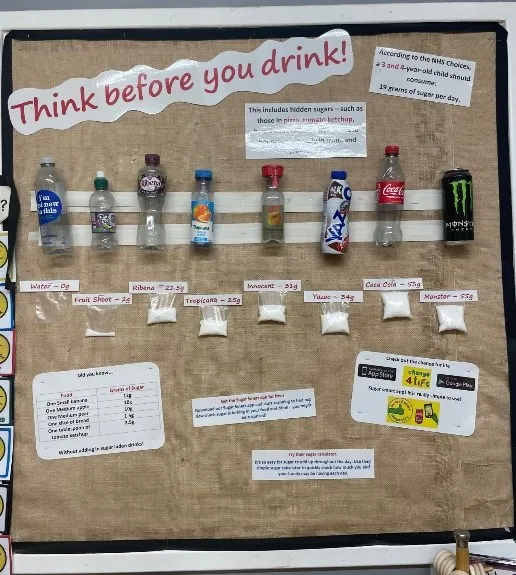
Think before you Drink display.
Located in the main entrance of the nursery, showing how much sugar is in each drink
To find out more about Self-regulation, join us for a webinar on 12th February 2025
References
EEF: EY Evidence Store EEF| Self-Regulation and Executive Function (educationendowmentfoundation.org.uk)
Further reading
ExecutiveFunctionInfographic_FINAL.pdf(harvard.edu)
Play and Self-regulation - PEDAL (pedalhub.net)
Play, Self-regulation, Executive Function and the Classroom Context - PEDAL(pedalhub.net)
